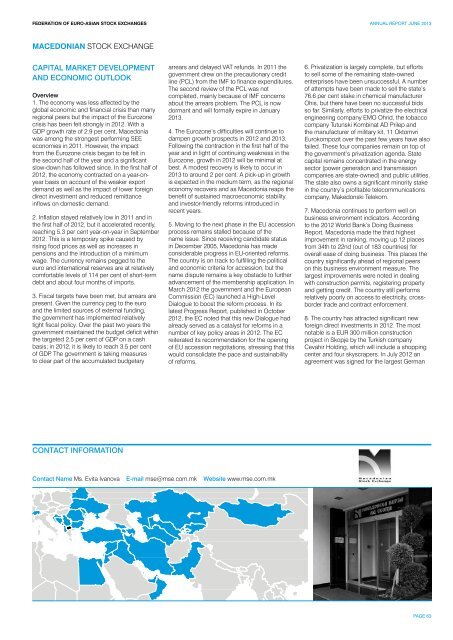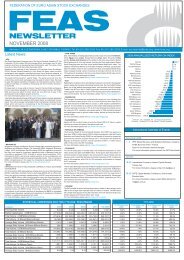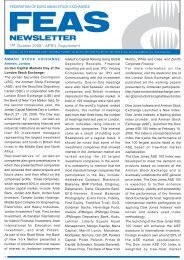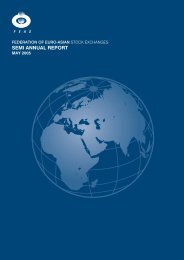JUNE 2013 - FEAS
JUNE 2013 - FEAS
JUNE 2013 - FEAS
Create successful ePaper yourself
Turn your PDF publications into a flip-book with our unique Google optimized e-Paper software.
FEDERATION OF EURO-ASIAN STOCK EXCHANGES ANNUAL REPORT <strong>JUNE</strong> <strong>2013</strong><br />
MACEDONIAN STOCK EXCHANGE<br />
CAPITAL MARKET DEVELOPMENT<br />
AND ECONOMIC OUTLOOK<br />
Overview<br />
1. The economy was less affected by the<br />
global economic and financial crisis than many<br />
regional peers but the impact of the Eurozone<br />
crisis has been felt strongly in 2012. With a<br />
GDP growth rate of 2.9 per cent, Macedonia<br />
was among the strongest performing SEE<br />
economies in 2011. However, the impact<br />
from the Eurozone crisis began to be felt in<br />
the second half of the year and a significant<br />
slow-down has followed since. In the first half of<br />
2012, the economy contracted on a year-onyear<br />
basis on account of the weaker export<br />
demand as well as the impact of lower foreign<br />
direct investment and reduced remittance<br />
inflows on domestic demand.<br />
2. Inflation stayed relatively low in 2011 and in<br />
the first half of 2012, but it accelerated recently,<br />
reaching 5.3 per cent year-on-year in September<br />
2012. This is a temporary spike caused by<br />
rising food prices as well as increases in<br />
pensions and the introduction of a minimum<br />
wage. The currency remains pegged to the<br />
euro and international reserves are at relatively<br />
comfortable levels of 114 per cent of short-term<br />
debt and about four months of imports.<br />
3. Fiscal targets have been met, but arrears are<br />
present. Given the currency peg to the euro<br />
and the limited sources of external funding,<br />
the government has implemented relatively<br />
tight fiscal policy. Over the past two years the<br />
government maintained the budget deficit within<br />
the targeted 2.5 per cent of GDP on a cash<br />
basis; in 2012, it is likely to reach 3.5 per cent<br />
of GDP. The government is taking measures<br />
to clear part of the accumulated budgetary<br />
arrears and delayed VAT refunds. In 2011 the<br />
government drew on the precautionary credit<br />
line (PCL) from the IMF to finance expenditures.<br />
The second review of the PCL was not<br />
completed, mainly because of IMF concerns<br />
about the arrears problem. The PCL is now<br />
dormant and will formally expire in January<br />
<strong>2013</strong>.<br />
4. The Eurozone’s difficulties will continue to<br />
dampen growth prospects in 2012 and <strong>2013</strong>.<br />
Following the contraction in the first half of the<br />
year and in light of continuing weakness in the<br />
Eurozone, growth in 2012 will be minimal at<br />
best. A modest recovery is likely to occur in<br />
<strong>2013</strong> to around 2 per cent. A pick-up in growth<br />
is expected in the medium term, as the regional<br />
economy recovers and as Macedonia reaps the<br />
benefit of sustained macroeconomic stability<br />
and investor-friendly reforms introduced in<br />
recent years.<br />
5. Moving to the next phase in the EU accession<br />
process remains stalled because of the<br />
name issue. Since receiving candidate status<br />
in December 2005, Macedonia has made<br />
considerable progress in EU-oriented reforms.<br />
The country is on track to fulfilling the political<br />
and economic criteria for accession, but the<br />
name dispute remains a key obstacle to further<br />
advancement of the membership application. In<br />
March 2012 the government and the European<br />
Commission (EC) launched a High-Level<br />
Dialogue to boost the reform process. In its<br />
latest Progress Report, published in October<br />
2012, the EC noted that this new Dialogue had<br />
already served as a catalyst for reforms in a<br />
number of key policy areas in 2012. The EC<br />
reiterated its recommendation for the opening<br />
of EU accession negotiations, stressing that this<br />
would consolidate the pace and sustainability<br />
of reforms.<br />
6. Privatization is largely complete, but efforts<br />
to sell some of the remaining state-owned<br />
enterprises have been unsuccessful. A number<br />
of attempts have been made to sell the state’s<br />
76.6 per cent stake in chemical manufacturer<br />
Ohis, but there have been no successful bids<br />
so far. Similarly, efforts to privatize the electrical<br />
engineering company EMO Ohrid, the tobacco<br />
company Tutunski Kombinat AD Prilep and<br />
the manufacturer of military kit, 11 Oktomvri<br />
Eurokompozit over the past few years have also<br />
failed. These four companies remain on top of<br />
the government’s privatization agenda. State<br />
capital remains concentrated in the energy<br />
sector (power generation and transmission<br />
companies are state-owned) and public utilities.<br />
The state also owns a significant minority stake<br />
in the country’s profitable telecommunications<br />
company, Makedonski Telekom.<br />
7. Macedonia continues to perform well on<br />
business environment indicators. According<br />
to the 2012 World Bank’s Doing Business<br />
Report, Macedonia made the third highest<br />
improvement in ranking, moving up 12 places<br />
from 34th to 22nd (out of 183 countries) for<br />
overall ease of doing business. This places the<br />
country significantly ahead of regional peers<br />
on this business environment measure. The<br />
largest improvements were noted in dealing<br />
with construction permits, registering property<br />
and getting credit. The country still performs<br />
relatively poorly on access to electricity, crossborder<br />
trade and contract enforcement.<br />
8. The country has attracted significant new<br />
foreign direct investments in 2012. The most<br />
notable is a EUR 300 million construction<br />
project in Skopje by the Turkish company<br />
Cevahir Holding, which will include a shopping<br />
center and four skyscrapers. In July 2012 an<br />
agreement was signed for the largest German<br />
CONTACT INFORMATION<br />
Contact Name Ms. Evita Ivanova E-mail mse@mse.com.mk Website www.mse.com.mk<br />
PAGE 63
















